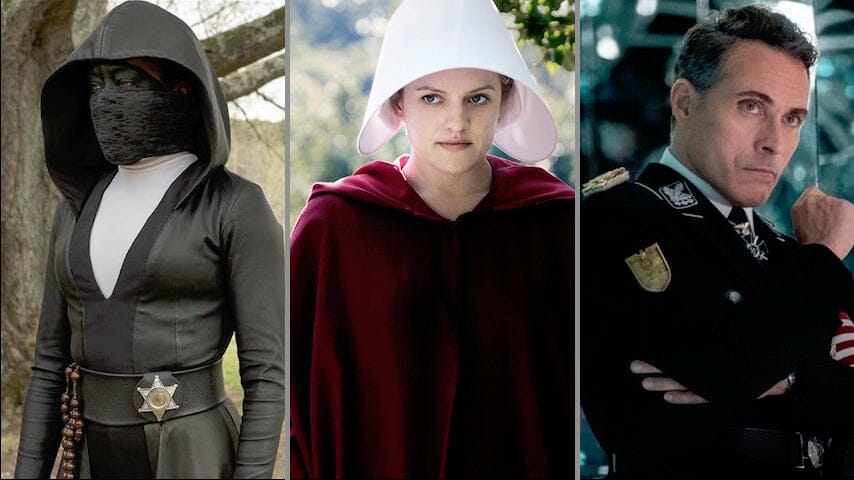Why Even the Worst Alternate Universes Can Feel Like Safe Spaces
The Handmaid’s Tale, The Plot Against America, and other series are escapist because they remind us that things could be worse.
Photos Courtesy of Amazon, HBO, Hulu
People think I’m weird when I tell them that I find The Handmaid’s Tale to be comfort viewing. Admittedly, I get it. Since its premiere in 2017, the uber-dark series has inflicted countless horrors upon its characters, both physical and mental, and some sequences have represented the platonic ideal of “hard to watch.”
But the reason Hulu’s Emmy-winning drama has such a hold on me is that while I know full well that the terrible things that happen are all rooted in reality, that the world it depicts isn’t impossible to imagine happening today, there’s the part of my brain that processes every awful moment from this perspective: “Well, things are bad right now, but at least they’re not that bad.”
That’s the unique appeal of the alternate universe, a storytelling trope that’s become increasingly prevalent on TV. It’s hardly a new idea—the question of “what if?” has always been a core baseline for so much in fantasy and science fiction. But over the past few years, more series aim deliberately to target non-genre audiences with premises that push beyond the world we know.
The Handmaid’s Tale is perhaps more officially categorized as “dystopian,” but another way to consider it is a show set on an alternate Earth, one where the reason things have gotten so bad is that several years ago the birth rate plummeted, stoking societal fears about extinction into creating this mess.
The key to an alternate universe is the reason it exists—the aforementioned “what if?” coupled with the question of “why?”—otherwise known as the divergence point. These can be relatively general, or extremely specific: Apple TV+’s For All Mankind is a series rooted in asking “what if the Soviet Union had beaten America to the moon in 1969?” Onscreen, the reason why the Russians won that particular battle has yet to be addressed, but the producers have an exact answer as to what made the difference in that show’s alternate history (revealed during a press conference I was at in February 2019, but I’d hate to spoil it).
For All Mankind is a show with an ultimately optimistic outlook, as the first season’s depiction of a revitalized space program led to things yet to happen in “our” reality in the 1960s: female astronauts and astronauts of color on the moon, the creation of a habitable moonbase, and the passing of the Equal Rights Amendment.
But it is perhaps the lone example of an alternate universe show that aims to inspire us. The rest either glory in the grey areas, or find divergence points which indicate a world which would be far, far worse than what we might expect.
-

-

-

-

-

-

-

-

-

-

-

-

-

-

-

-

-

-

-

-

-

-

-

-

-

-

-

-

-

-

-

-

-

-

-

-

-

-

-

-








































